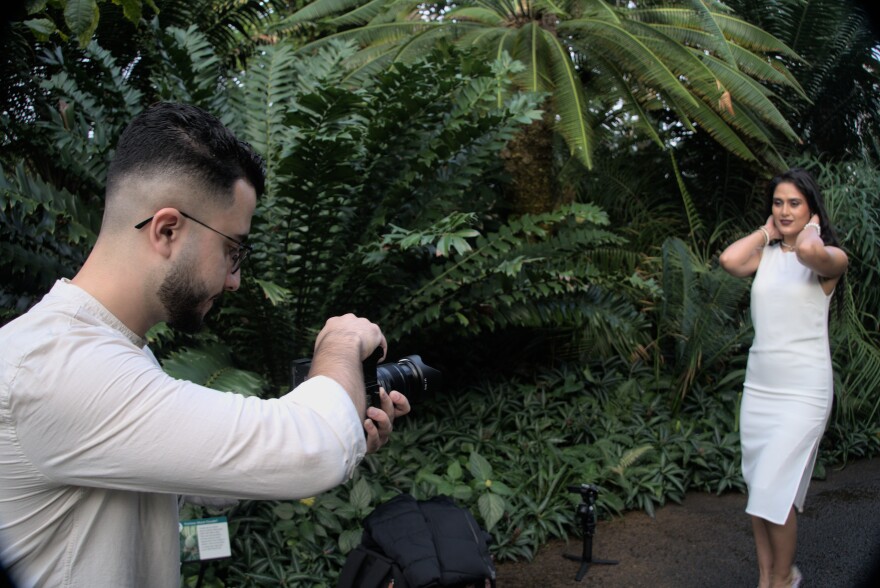Pouya Zabihullah left Kabul, Afghanistan, in 2010 with his parents and brother. His family moved to Turkey to escape family issues and the imminent threat of the Taliban controlling their country. While there, Zabihullah’s family sought assistance from the United Nations and then moved to St. Louis in August 2021.
The 21-year-old Afghan and his family came to the region because they knew people who could assist them with resettlement.
During the first few months in St. Louis, Zabihullah attended financial literacy courses and beginner English classes at the International Institute of St. Louis to prepare to do business in the region.
Zabihullah speaks five languages fluently and speaks little English. He said through a translator that St. Louis has many resources to help Afghans quickly get on their feet.
Zabihullah took advantage of one of those resources by applying for the International Institute’s Afghan Entrepreneurship Grant Fund, a program that provides $15,000 grants to newly arriving Afghans to start a business. Zabihullah is a photographer, who began taking professional photos as a teenager and later started his wedding photography business.
His company, WedVio Photography, is popular in Turkey, and he is trying to become more established in St. Louis, which is why he applied for the grant. He did not receive a grant, so he works at a sandwich shop to fund his photography business on his own.

Within the past year, the institute helped resettle more than 700 Afghans in St. Louis. Institute officials created the Afghan Community Support Program last year to help new arrivals pay rent for three months, find stable employment and take care of basic needs.
The services provided through the assistance program allow arriving Afghans to start contributing to the local economy, said Moji Sidiqi, program manager of the institute’s Afghan Community Development Program.
“When refugees and immigrants settle into new spaces, they go to school, they start businesses, and they employ other people,” Sidiqi said.
Thirty-one Afghans applied for the institute’s entrepreneurship grant program. Although Zabihullah was only a finalist in the first funding round, he is still committed to growing his WedVio in St. Louis. Zabihullah faces challenges with getting the photography company up and running in St. Louis. The primary one is the language barrier.
He hopes to connect with other professional photographers in the area to discuss pricing, because he learned that his services should be priced differently in St. Louis than for his clients in Turkey.
Zabihullah believes what makes his work distinctive from other wedding photographers in the area is his cultural experience. Speaking several languages and knowing a variety of religious traditions helps market him in St. Louis, especially since it’s a city with communities of immigrants and refugees, according to Sidiqi.
The International Institute wants to use the Afghan Community Support Program to also attract secondary migrants to the city, because many Afghans have an entrepreneurial background and can contribute immensely, said institute CEO and President Arrey Obenson.
“Hopefully, we see many of them setting up businesses … that should eventually lead to economic growth,” Obenson said.
The institute has seen 131 Afghans move to the St. Louis region from other cities because of the support available to them from the nonprofit organization.

Amin Sahel is struggling trying to get his business operating in St. Louis. He and his family moved to St. Louis from Kabul in June 2021. Sahel worked for the U.S. government as an interpreter and cultural adviser. He made the decision to quickly leave Kabul when U.S. officials warned him to leave because the Taliban would target him since he worked for the federal government.
St. Louis was his first choice. Sahel’s family in the region provided a room in their home for him and his wife until they could find stable housing. He picked up a job as an operations coordinator at BJC Healthcare and later moved his family into their own home.
Sahel is working at the health care organization to fund his online Afghan rug and carpet business. He is working on a business plan and is trying to start a limited liability company. But he is struggling with funding for the online shop.
“I am the only person who works in my family,” Sahel said. “I don't want to put any pressure on my wife to help me with all the expenses.”
He said it will take about $20,000 to start his company, and he has about $5,000 saved.
Sahel wants to start the rug company because he noticed that there are not enough reasonably priced Afghan rugs or carpets in the region. He also wants to sell other culturally related household goods to help people from Afghanistan in the area feel more comfortable in their new homes.
“I'm sure that it's [his company] not only beneficial for me, financially, but also it will be beneficial for other Afghans who recently came to here or for those people who lived here for years and years, and they are expecting to have their Afghan or traditional materials here,” Sahel said.
Sahel keeps how the community and his family helped him gain his footing in St. Louis in the back of his mind. In the future, he wants to use his company to hire other Afghans in the region who might need work to help their families or to support their dreams.
“[The business] will have positive impacts on the community, it's not just about the financial base, but also providing job opportunities for those people who want to work especially, Afghans, who came from Afghanistan with [language] difficulties,” Sahel said.



